Meet Our Faculty
Calbright faculty have academic and professional expertise in the industries our students are preparing to enter and provide support and guidance – from the curriculum and technology to networking and preparing for interviews. They’re united by their belief that innovations in online learning can make college more personal, flexible, and responsive to students’ needs. They include:
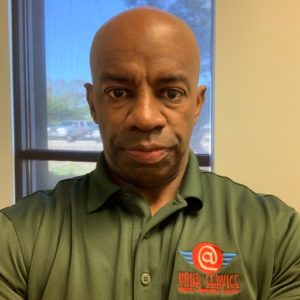
Michael Stewart
A faculty member in Calbright’s IT program, Michael Stewart is also the president of the Calbright Academic Senate. He’s been teaching IT for eight years at the collegiate level, and has been running his own IT company for 20.
“IT changes quickly, so we are able to use the flexibility that Calbright offers to make sure nothing our students learn is obsolete,” he says. “I tell my students all the time: everything you’re learning here is completely up to date as of five minutes ago.” Faculty are not only using the flexibility of Calbright’s curriculum to keep up with the industry: they’re using it to stay on the same page as their students.
“Teaching at Calbright is a process of constant iteration,” Michael continued. “At faculty meetings we’re always looking at where our students are, what they’re struggling with, and realizing hey, we could add this and make it a little better. We can offer this new thing to help them. We never stop looking at what we deliver and how to improve it. When we conduct a student survey and ask students who are further along in the course about what areas need improvement, or what was lacking, or how they enjoyed it, we can make immediate adjustments to improve the experience for students who are behind them.”
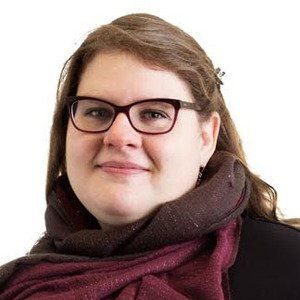
Elizabeth Biddlecome
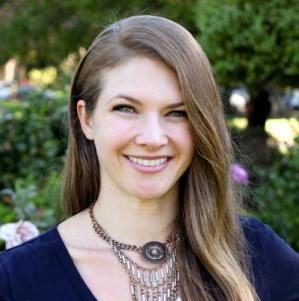
Ashley Odell
Ashley Odell has worked in career services and instruction since 2012, including stints at the University of California. Davis and the Tri-Valley One Stop Career Center, where she helped support career development for students and un-and-underemployed adults.
At Calbright, she has developed the new Career Readiness program that prepares students to access new fields, find the jobs they want, and thrive in the workplace by applying soft skills, effective communication approaches and positive mindsets.
“Students need to be prepared to successfully secure employment after completing their educational program by developing strong job-search approaches, which are covered in depth in the curriculum,” she says. “Technical skills are not enough to get a job and succeed in the workplace, students must also understand and apply their own values, strengths and skills to their work, work collaboratively with others, find motivation, take initiative, set goals, make decisions, manage stress, be resilient in the face of setbacks, manage their time appropriately and apply a growth mindset and self-compassion when things get hard.”
She says Calbright is particularly positioned to support working adults because its model is more flexible and more focused on mastery. “We support the student in reviewing the content and repeating the assessments until they are able to demonstrate the skill, because the coursework is designed to apply directly to the workplace and content has been chosen specifically because of the clear relationship to success as an employee.”
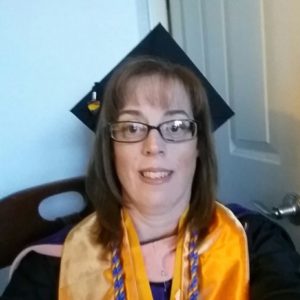
Cindy Carney
Cindy has worked in the healthcare industry since 1995, and has been teaching Medical Office Admin, Billing, and Coding since 2010.
“I have worked in different areas of healthcare, but medical billing and coding are my favorite,” she said. “I love that at Calbright we are giving an opportunity to individuals to improve their skills and obtain a new career that they’ll love, too.”
She says the secret to a successful online education is to connect with her students in meaningful ways.
“Being an online faculty member means you have to be more proactive and deliberate in what you are doing to reach the student. At Calbright, we have the ability to see and understand that our students have obstacles or other distractions that can sometimes hinder them from getting their work completed or even reaching out when they need help. Building a relationship with the student helps them to build trust and reach out when help is needed. And because we’re flexibly paced and focused on the student’s needs, we can offer a lot more support than most schools.”
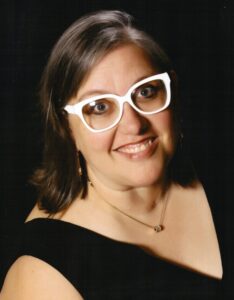
Shannon Reynolds
Shannon Reynolds started her career as a band director for schools, and quickly learned what kind of education she loved.
“I am not a ‘sit in your seat with your hands in your lap and sing quietly’ kind of teacher,” she said. “I’m a ‘learn by movement, sing louder, dance around, feel the beat’ kind of girl.”
That’s the spirit she brings to online learning as instructional designer, creating courses meant to keep people engaged and excited with their education.
“At Calbright we’re doing on-demand training, industry certification based training, we’re working with our student population to make them employable in new industries, all things I’m passionate about. But it’s more than that,” she said. “Calbright has a vision. We move faster than the speed of business to create the environments our students need.”
That has a big impact, both on the way she works, and on what students experience. “It’s why I love my job. The needs of students change, the needs of the economy changes, and so we innovate to keep ahead and help our students get the career they want.”
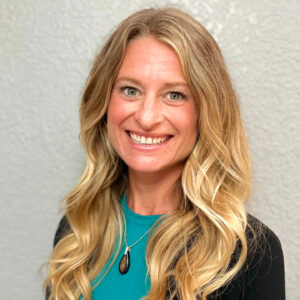
Jessica Schaid
Jessica Schaid is Calbright’s faculty member for Curriculum and Assessment, making sure that the way we teach at Calbright best supports students in their future careers.
She’s passionate about working at Calbright because of what she had to go through to get her degree.
“I had to take out a tremendous amount of student loan debt to get my teaching degree,” she said. “I had worked at Target at the time, as a cashier in customer service, trying to make some extra money – but most of my education was paid for by student loans.”
She works at Calbright because it’s a free college for all Californians.
“After my own struggle with student debt, I have always been thinking about ways that people can advance their education, have greater earning power, and not have to go into that debt,” she said. “I didn’t like the struggle of having to pay off those student loans, I’m glad they’re done now, and I really wanted to support an organization that didn’t make its students go into debt.”
What she loves most is that Calbright is open to new approaches and big ideas to support students in ways that traditional colleges aren’t.
“If the traditional model of a college or university worked for our students, they would be there!” she said. “We need to do things differently. The more that we can think outside the box, so that our students can learn differently, in ways that work for them, the more our students will have a deeper, more successful, learning experience. Calbright is open to any idea that will help our students, and that makes it a dream job for me.”

Benjamin Ringgenberg
When Benjamin Ringgenberg was an adult student trying to graduate college for the first time, a teacher inspired him and changed his life. Now he wants to help others the same way.
“I started college and stalled in my 20s, so I went into sales,” he said. “Sales was very lucrative, and I worked with a lot of the computer programs that are industry standards now, like Salesforce, when they were just getting started. But I realized at 29 that I needed to make a career change. I was good at sales, but sales was tough! It’s an industry that I wasn’t sure I could survive in. It wasn’t right. But if I was going to change careers, how could I make myself marketable?”
At Calbright, his official job is to help students work through problems in our IT and Salesforce programs, but most of the time he talks about how students can make their classes work in their life.
“We’ll talk about the technical stuff, but what they really want support with is: ‘How do I stay motivated? How do I make this work in my life?’ ‘How do I remember what I’m learning?’ ‘How do I keep going?’”
Those are conversations he loves to have, and he has a gift for helping.